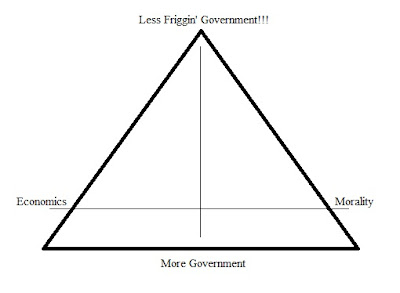I've thought to myself, at times, that opposites aren't fully understood. They seem pretty straightforward, but they can be more complex than they are given credit for. Many of you readers, I'm sure, are familiar with the “Either/or” logical fallacy (also known as a False Dilemma). In this fallacy, there are more than three options, but person A presents the dilemma to person B as if there were two, and only two, choices.
Example:
Child: “Mamma, can I have a cookie now or later?”
The child presents only two options as an either/or choice, and tries to get the mother to not notice any additional option. You see, the child paints the question as if it's just a one dimensional choice - and that dimension is the dimension of time:
Cookies soon -------------------------------- Cookies later
Near time frame and far time frame. Two opposites, yes, but it ignores a third dimension: The dimension of how many cookies are given.
 In the diagram above (I'm sure you will all be impressed at the creative artwork that went into that one), you can see both dimensions: Time, and amount of cookies. With this more comprehensive view of the situation, the mother also can see the option of not giving the child a cookie at all.
In the diagram above (I'm sure you will all be impressed at the creative artwork that went into that one), you can see both dimensions: Time, and amount of cookies. With this more comprehensive view of the situation, the mother also can see the option of not giving the child a cookie at all.
That specific example is easy and childish, but I think that we usually think of opposites as always coming in a pair, and many of them come in groups of three. For instance, what's the opposite of taking action to something good? Taking action to do something evil!
Doing evil ---------------------------------- Doing good
Perfect: We have our opposites. But could there be a third option which is the opposite of both? I say yes. This shows opposite sides of the dimension of morality here, but both involve action. The opposite of action is inaction, and therefore there is another dimension:
 It may seem inconceivable that anything could have two opposites, because we are so used to used to thinking of opposites on opposite sides of a one-dimensional line. However, the pattern shows up again and again throughout life. For instance, the speaker in my class about christian principles in government tonight pointed out another triangle of opposites:
It may seem inconceivable that anything could have two opposites, because we are so used to used to thinking of opposites on opposite sides of a one-dimensional line. However, the pattern shows up again and again throughout life. For instance, the speaker in my class about christian principles in government tonight pointed out another triangle of opposites:
Often, we hear about being politically “to the left” or “to the right.” The far left might be communism or socialism; interested in large centralized government being used to create change and to redistribute wealth and take care of the society. One the far right is said to be fascism; the right perhaps encourages centralized government to keep things at the status quo, or to enforce moral boundaries (like no abortion). Many people can't explain exactly explain what dimension this measures – the best explanation I've heard looks like this:
More gov in economics --------------------- More gov in moral issues
So, if you buy into that scheme, whether you think of yourself being more “to the left” or more “to the right,” you are always in favor of more government. More, and more, and more government. But of course there is the other dimension as well:
 Then I thought to myself about other opposites. There's hot and cold. Surely, there couldn't be an opposite to both of those! But then I thought to myself, spiritual beings may not have a physical temperature, and may not be either physically hot nor physically cold.
Then I thought to myself about other opposites. There's hot and cold. Surely, there couldn't be an opposite to both of those! But then I thought to myself, spiritual beings may not have a physical temperature, and may not be either physically hot nor physically cold.
Finally, there's love. I've been a firm believer in the triangle opposites of love for a long time. If I ask people “what is the opposite of love?” most would say “hatred.” Love is passion for someone's betterment, and hatred is passion for someone's pain or destruction. We see hatred painted very clearly in stories where a person hates someone else, and then dedicates a lot of time and effort to damaging that person, even to their own detriment sometimes.
Desire for their betterment ------------------------ Desire for their harm
But both of these options involve passion. In both cases, the person is very emotionally involved. In either case, it can be self-sacrificing: Whether self-sacrificing love, or seeking vengeance even to the point of destroying one's own life. What is the opposite of both? Apathy. No passion for or against the other person; an apathetic person couldn't be bothered to take revenge, since they have their own life to lead.

Pathos versus non-pathos. (Passion versus apathy) On one dimension, we have desire for the other person's betterment or desire for their harm. On the other dimension, are you even having desire about their life at all?
